Chao Jin-rong maintains the Spirit of Traditional Military Dependents' Villages/趙金蓉 暖暖人情話眷村
Chao Jin-rong
maintains the Spirit of Traditional Military Dependents' Villages
◎English translation: Wendy Wei Chang
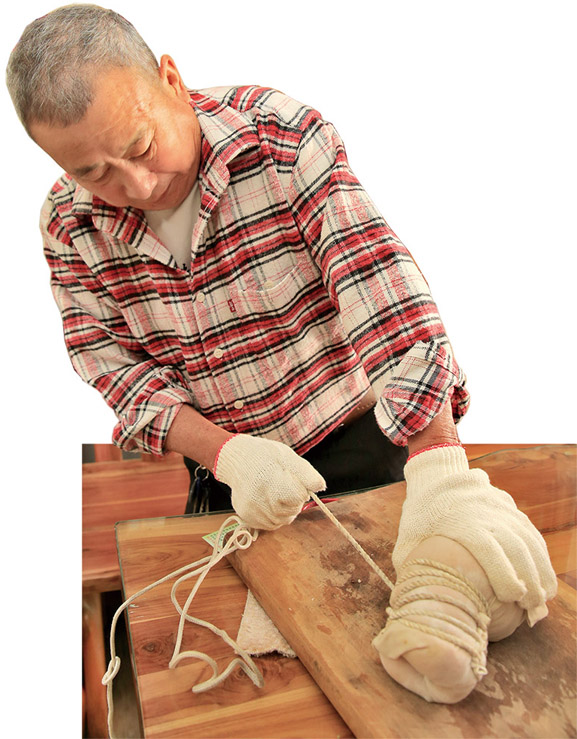 ◎Photos by Lin Yu-hung
◎Photos by Lin Yu-hung
One of Taiwan's air force bases are located in Gangshan District. There were 18 military dependents located in the district. Lecyun was a village which provided high level military officers spacious, single-family homes that were originally intended for officers during the Japanese colonial era. Families of non-officers lived in smaller homes that were constructed by the Taiwanese government.
In the 1980s, the Ministry of National Defense remodeled the villages in Gangshan. Later, seventeen out of eighteen villages were demolished. Only Lecyun Village was preserved due to its unique architecture and historical legacy. In 2010, part of the village was recognized as historical sites. Residents of the demolished villages were relocated to an apartment complex named "New Lijhih Community". Seven years ago, the couple Mr. Chao Jin-rong and Ms. Lan A-Er were also relocated. They admit that although life in an apartment complex feels different, their new home is cozy and heartwarming. Mr. Chao remembers when he still lived in the village, and people would chat with their neighbors every day, discussing what they were going to have for dinner etc. During the summers, people would sit together outside, sipping drinks and enjoy summer breeze. At that time, they could easily identify any newcomers. In the apartment complex, people keep their front doors closed and although Mr. Chao still interacts with his neighbor from time to time, the boisterous atmosphere and camaraderie of the village has long since gone.
Mr. Chao came to Taiwan when he was 8 years and in 1959 he joined Taiwan's Marine Corps Amphibious Reconnaissance and Patrol Unit. He was even honored as the one of the best swimmers in the ocean which is depicted on a wooden board that still hangs on his wall. Mr. Chao retired from the military in 1975 and for the next ten years, he started to run a cargo ship in order to improve his family's financial situation. He retired two years after he had an accident off the shore of Luzon in the Philippines, which resulted in a crack in the hull of his ship. Luckily, he was able to get the ship to shore and was rescued. After he gave up his maritime career, he became a janitor at a swimming pool in Lujhu's District Office.
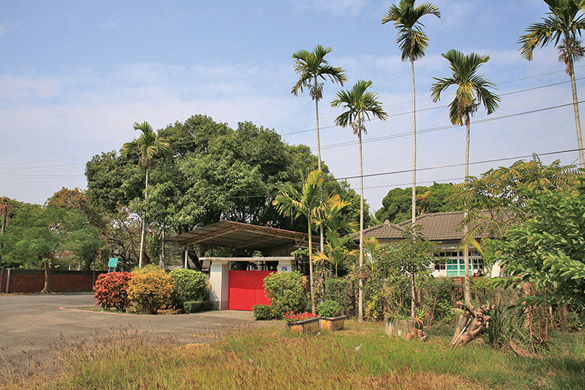 Although, Mr. Chao is originally from Hebei, China, and his wife is a local from Taiwan. He met Mrs. Chao, when he was serving in the military. He even had her name tattooed on his arm as a testimony of their relationship. One of the challenges they had overcome was differences in family backgrounds. However, Mrs. Chao recalled how her now late mother-in-law had been very kind to her, even taking the time to teach her how to make the Chao family's traditional New Year's dish of Hebei dried radish. They had a close relationship and would take her on international vacations.
Although, Mr. Chao is originally from Hebei, China, and his wife is a local from Taiwan. He met Mrs. Chao, when he was serving in the military. He even had her name tattooed on his arm as a testimony of their relationship. One of the challenges they had overcome was differences in family backgrounds. However, Mrs. Chao recalled how her now late mother-in-law had been very kind to her, even taking the time to teach her how to make the Chao family's traditional New Year's dish of Hebei dried radish. They had a close relationship and would take her on international vacations.
Mr. Chao is a great cook. During his time with the Lujhu District Office, he would often bring in homemade scallion pancakes, dumplings and leek pies to share with his colleagues. His dishes were very popular. Even though Mr. Chao retired from the District Office 14 years ago, he continues to hone his cooking skills. During the Chinese New Year, he makes cured pork and sausages on his balcony and his time-consuming, complex, specialty dish of marinated pig skin rolls for his in-laws.
These days Mr. and Mrs. Chao spend a lot of time creating culinary delights. When they are not cooking, Mr. Chao enjoys spending time in a park drinking hot tea and chatting with his old friends. Mrs. Chao keeps busy volunteering at a local community center. The couple still exhibits the kindness and warmth found in traditional military villages.
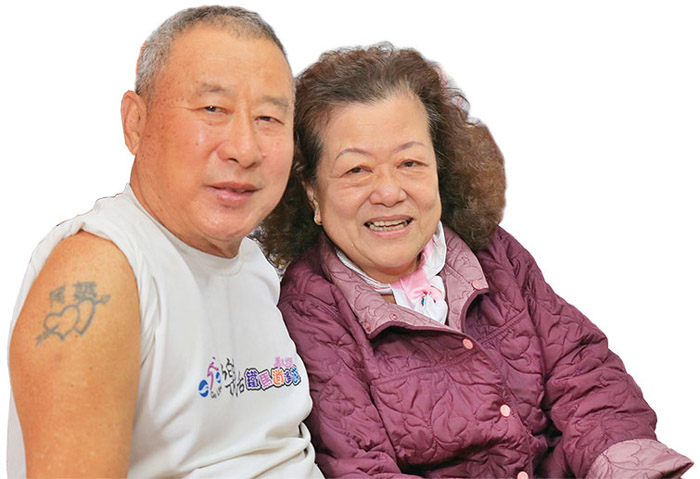
趙金蓉 暖暖人情話眷村
◎文/侯雅婷
◎攝影/林裕鈜
岡山區為台灣空軍基地之一,昔日設有18處眷村,其中,樂群新村是接收日軍官舍,獨戶、大坪數,是高階軍官的宿舍。1980年代,國防部推動眷村改建,除了樂群新村因特殊的建築形式及歷史背景保留,2010年成為市定古蹟,其餘17處眷村皆被拆除,居民全搬遷至高聳的大廈建築「勵志新城」。
走訪搬至勵志新城已7年的趙金蓉、藍阿娥夫婦,屋內佈置得溫馨舒適,當被問起住的還習慣嗎?他坦言,感覺不一樣了!
趙金蓉說,從前眷村天天與左鄰右舍一塊聊天,村裡出現生面孔,還會趨前詢問,用餐時,鄰居會彼此瞧瞧吃些什麼?夏天時,家家戶戶都拉張板凳坐在屋外乘涼,喝點小酒,天南地北的閒談。他認為,眷村精髓在於敦親睦鄰、守望相助。搬進大廈後,一進門很自然地就關起門,雖然和鄰居偶有交流,但隔著門,人情就淡薄,原本眷村裡熱絡、頻繁的交流已不復見。
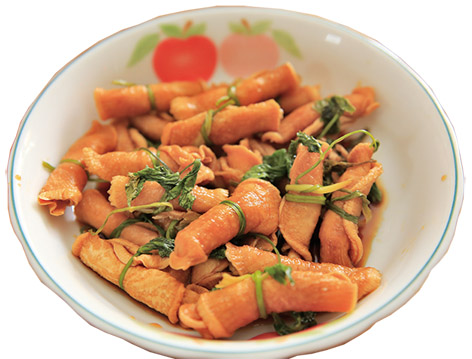 趙金蓉伉儷是外省與本省家庭的結合。趙金蓉是河北人,軍中服役時結識女友、也是現在的太太藍阿娥,戀愛時手臂上甚至刺了藍阿娥的名字,見證兩人的愛情!藍阿娥成長於本省家庭,當時兩人努力克服省籍觀念,才能共結連理。婚後藍阿娥與婆婆的感情深厚,她懷念起過世的婆婆待她非常好,夫妻倆總帶著婆婆一起出國遊玩,她也跟著婆婆學習夫家河北蘿蔔乾的醃製法,雖然做工繁雜,卻是趙家人過年必備的佳餚。
趙金蓉伉儷是外省與本省家庭的結合。趙金蓉是河北人,軍中服役時結識女友、也是現在的太太藍阿娥,戀愛時手臂上甚至刺了藍阿娥的名字,見證兩人的愛情!藍阿娥成長於本省家庭,當時兩人努力克服省籍觀念,才能共結連理。婚後藍阿娥與婆婆的感情深厚,她懷念起過世的婆婆待她非常好,夫妻倆總帶著婆婆一起出國遊玩,她也跟著婆婆學習夫家河北蘿蔔乾的醃製法,雖然做工繁雜,卻是趙家人過年必備的佳餚。
趙金蓉8歲來台,1959年投身軍旅,服役於海軍蛙人部隊,家中至今仍懸掛「海中姣龍」的木匾,記載著他對國家的貢獻。為了改善家庭經濟,1975年退伍改跑商船,當了10幾年的船員,有回在菲律賓呂宋島遇上了船難,因發現船身裂縫,緊急將船駛向岸邊,同時以無線電求救,所幸及時獲救,這也讓他萌生退意,不到兩年時間,他不再跑船,改當路竹鄉公所(現為區公所)泳池管理員,就是在這個時期,讓他精湛的廚藝徹底發揮。
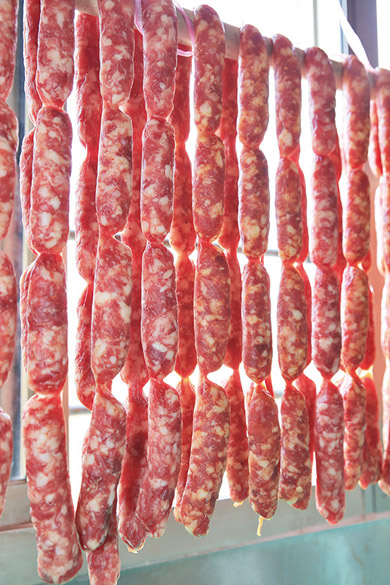 趙金蓉煮得一手好菜,他不時與同事分享自製的蔥油餅、水餃、韭菜盒子等,大受歡迎。即使14年前從區公所退休,一身好手藝也沒閒著,過年時,仍利用大廈陽台製作臘肉和香腸,並為親家製作費時費工的功夫菜─捆蹄。
趙金蓉煮得一手好菜,他不時與同事分享自製的蔥油餅、水餃、韭菜盒子等,大受歡迎。即使14年前從區公所退休,一身好手藝也沒閒著,過年時,仍利用大廈陽台製作臘肉和香腸,並為親家製作費時費工的功夫菜─捆蹄。
藍阿娥說,平日他倆各忙各的拿手料理,空閒時,趙金蓉就到公園找老朋友泡茶聊天,藍阿娥則擔任社區志工,夫妻倆始終保有眷村子弟濃厚的人情味。